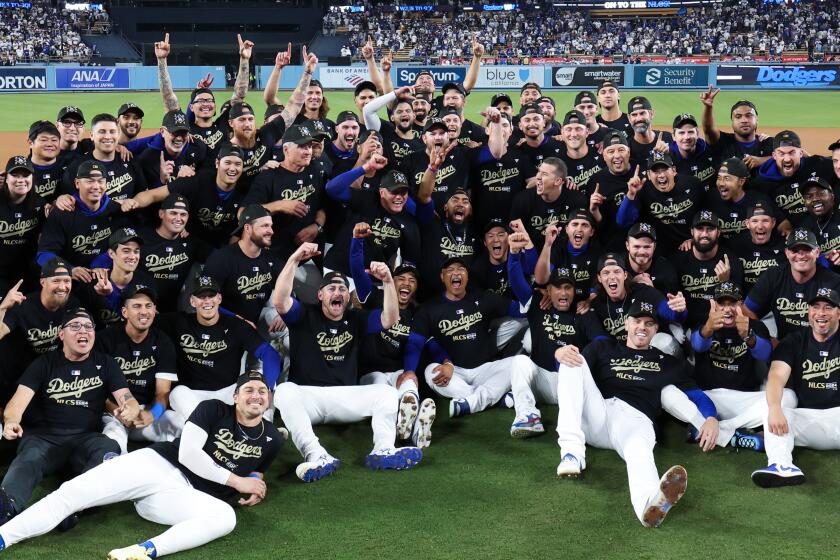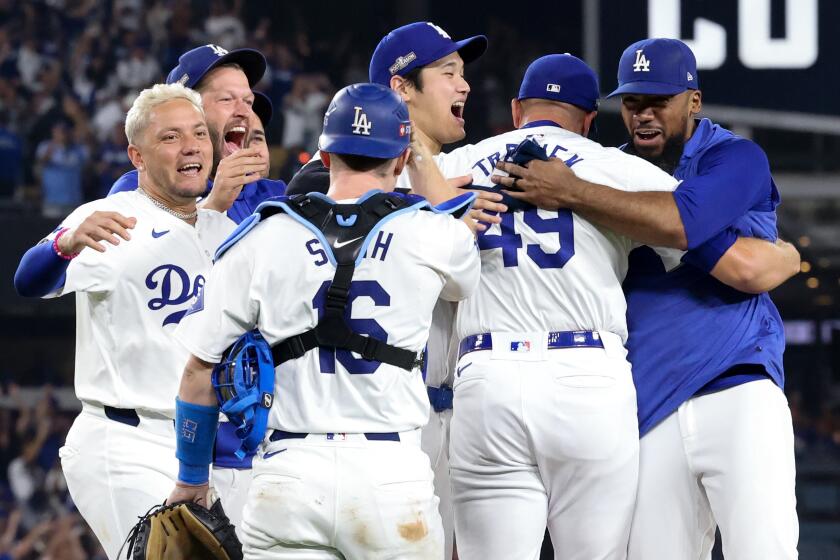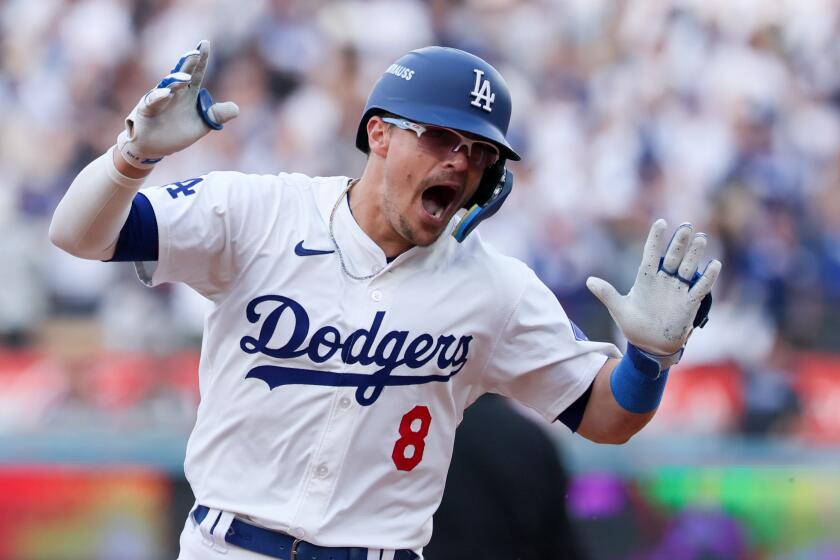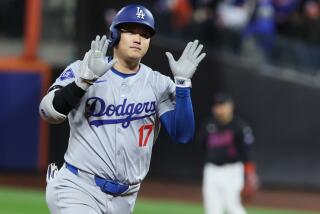
- Share via
The shortest player on the field at Dodger Stadium looked as if he was the tallest.
Yoshinobu Yamamoto was a giant on Friday night.
And to think the 5-foot-10 right-hander from Japan started for the Dodgers in Game 5 of their National League Division Series only because they figured their relievers couldn’t pitch the entire game.
Yamamoto turned the anticipated bullpen game for the Dodgers into something more conventional. The three innings they were counting on him to pitch became four, and eventually five. He never conceded a run.
Dodgers put their recent postseason past behind them by defeating a San Diego Padres team that likely was their biggest hurdle to a World Series title.
When the game was over, the Dodgers were spraying sparkling wine and pouring beer on each other in their locker room, celebrating their passage to the NL Championship Series. In the middle of the celebration was Yamamoto, the unlikely pitcher of record in the 2-0 victory over the San Diego Padres.
Yamamoto was inconsistent for the majority his first season with the Dodgers, his adjustment to the major leagues delayed by a shoulder injury that sidelined him for three months. Not what the Dodgers were expecting from a player they signed in the winter to a 12-year, $325-million contract.
However, as Dodgers controlling owner Mark Walter pointed out, “He showed up tonight.”
Bottle in hand and smile on his face, Walter continued, “Shut them out for five innings. Takes guts to do that when you struggle a little.”
A little?
Six days earlier, Yamamoto was absolutely destroyed, by the same opponent, in the same stadium. He lasted only three innings in Game 1 and was charged with five runs.
“Of course, I wasn’t able to get away with it right away,” Yamamoto said in Japanese.
Yamamoto explained that he received words of encouragement from teammates. When the Dodgers were in San Diego for Games 3 and 4, Yamamoto was invited out by Kiké Hernández.

“We talked for about two hours,” Yamamoto said.
Yamamoto added, “I think I owe my performance today to my teammates.”
Hernández said there was a reason the Dodgers invested as much in Yamamoto as they did. He said it wasn’t because he projected to be great one day in the future.
“He is great,” Hernández said.
The Dodgers could have started Jack Flaherty. However, Yamamoto was on the same six-day cycle on which he was kept in the regular season. Plus, the Dodgers thought they could rely on a pitcher who was known in his home country for his resiliency.

Around this time last year, president of baseball operations Andrew Friedman watched the Japan Series between the Orix Buffaloes and Hanshin Tigers. He saw Yamamoto give up a career-worst seven runs in a Game 1 defeat, but he also saw how Yamamoto responded to the setback. In Game 6, Yamamoto threw a 138-pitch complete game and struck out 14 batters to set a Japan Series record.
Talking to Yamamoto after his Game 1 debacle in this division series, Friedman said, “You could get the sense that he wanted the ball.”
Manager Dave Roberts called attention to Yamamoto’s international experience.
“When you pitch for the WBC, for the country of Japan, those are the highest stakes you can have,” Roberts said.

Roberts figured national pride would again be a motivating factor for Yamamoto. Pitching opposite him in Game 5 was Yu Darvish, making this postseason game the first to feature two Japanese starters. The contest was broadcast live in Japan on network television.
Yamamoto returned to the Dodger Stadium mound as a new pitcher.
Between starts, the Dodgers had worked with Yamamoto on the positioning of his glove, which they believed revealed to the Padres in Game 1 which pitches he was about to throw. He started Game 5 by retiring the side in order. Yamamoto gave up successive singles to Kyle Higashioka and Luis Arráez in the third inning, but forced Fernando Tatis Jr. to ground into a double play.
Yoshinobu Yamamoto and the Dodgers’ pitching staff combined for a shutout and Kiké Hernández and Teoscar Hernández each hit home runs in win over the Padres.
Yamamoto retired the next six batters to protect the 1-0 advantage gifted to him on a home run by his muse, Hernández. Before reaching the steps descending into the dugout in the middle of the fifth inning, Yamamoto was tightly embraced by Roberts. Yamamoto had thrown only 63 pitches, but Roberts was mindful that he hadn’t pitched into the sixth inning since he blanked the New York Yankees over seven innings on June 7. His night was over, at least on the mound.
Later in the clubhouse, Yamamoto was reliving his night when Shohei Ohtani approached him with a bottle of sparkling wine pointed in his direction. Ohtani emptied the bottle’s contents on Yamamoto.
“He was overwhelming,” Ohtani said in Japanese. “It was the kind of pitching that overwhelmed and didn’t let the opponent get close.”
An extremely light drinker, Yamamoto said that even the magnitude of this victory couldn’t drive him to imbibe any of the adult beverages provided to the players.
Kiké Hernández was a hero for the Dodgers in 2017, and he showed in Game 5 of the NLDS against the Padres what he can do when the season is at stake.
However, he joked, “The alcohol got in me through my skin.”
At that moment, the ups and downs of the previous six months were forgotten. If a disastrous performance in October can diminish a player’s regular-season achievements, the opposite also has to be true: A memorable game in the playoffs can minimize a player’s regular-season failures.
On Friday night, Yoshinobu Yamamoto was a hero.
More to Read
Are you a true-blue fan?
Get our Dodgers Dugout newsletter for insights, news and much more.
You may occasionally receive promotional content from the Los Angeles Times.










